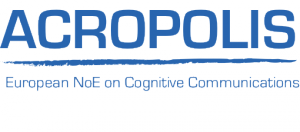Cognitive Radio Medium Access Control and Network Solutions
(MACNET’13)
Half day workshop
The introduction of the cognitive paradigm in wireless networks requires a step beyond the definition of a single, “cognitive” smart device. Specifically, it requires work towards the design of a network of smart devices cooperating in order to efficiently coexist with other radio systems in a given geographical area. The achievement of this goal requires a novel approach in the design of algorithms and protocols that defines the interaction between nodes in the network, capable of integrating and taking into account information related to both internal network status, as well as traditional “legacy” wireless networks and the external environment.
As a consequence, in recent years several research efforts targeted the design the development of Medium Access Control (MAC) and network protocols for cognitive wireless networks, aiming at defining solutions capable of grasping the specific characteristics and requirements of cognitive radio networks so to increase efficiency in coexistence with other systems and overall network performance. In particular, MAC protocols specific for cognitive radio systems, taking into account the role of primary on resource availability in a secondary network as well as joint dynamic channel allocation and routing schemes have been investigated in interweave cognitive networks, and cognitive radio specific routing metrics for both interweave and underlay networks have been proposed.
Nevertheless, several open research issues stand in this field. Adaptability to fast varying conditions due to e.g. terminal mobility, as well as capability of taking advantage of multiple Radio Access Technologies are still hot research topics. Definition and implementation of common control channels and in particular the impact of adopting different RATs for control and data channels still need to be investigated, and more in general the adoption of multiple RATs in cognitive networks open new and intriguing research challenges.
In the above context, this workshop aims to gather researchers, engineers both from academia and industry (universities, research centres, network operators, etc.), as well as end users which aim to inspire the analysis and development of new solutions for MAC and network algorithms and protocols in cognitive radio networks, taking into account specific requirements of different application scenarios (e.g. deployment in TV White Spaces bands vs. use in conjunction with cellular networks).
Therefore, the Workshop is open contributions presenting advances in various research areas of cognitive networking related to the technical problems and challenges defined above, specifically, but not exclusively, including the following topics:
- Cognitive Medium Access Control protocols
- Neighbour discovery schemes in CR
- Network organization schemes in CR
- Cognitive routing metrics and protocols in underlay cognitive networks
- Joint dynamic channel allocation and routing in interweave cognitive networks
- Resource allocation in cognitive networks
- Solutions for multiple RAT management in cognitive networks
- MAC protocols for CR
- Cooperative and non-cooperative spectrum sensing
- Decision making algorithms for CR
- Security aspects in MAC and network design for CR
- Energy efficiency in cognitive radio
- Cognitive management systems in future internet
The workshop accepts only novel, previously unpublished papers. All submissions should be written in English with a maximum paper length of five (5) printed pages (IEEE Trans. Conf format) including figures without incurring additional page charges (maximum 1 additional page with over-length page charge if accepted).
All papers will be subject to a peer-review process.
Schedule:
Paper submission: June 7, 2013 June 16, 2013 (Hard deadline)
Camera Ready: July 15, 2013
Workshop Chairs
Luca De Nardis, Sapienza University of Rome, Italy <lucadn@newyork.ing.uniroma1.it>
Adrian Kliks, Poznan University of Technology, Poland <akliks@et.put.poznan.pl>
Liljana Gavrilovska, Ss Cyril and Methodius University, Republic of Macedonia, <liljana@feit.ukim.edu.mk>
Dionysia Triantafyllopoulou, University of Surrey, UK <d.triantafyllopoulou@surrey.ac.uk>
Download a pdf version of this Call for Papers
This workshop is an initiative supported by the ACROPOLIS Network of Excellence, funded by the European Commission (Grant ICT-257626)

